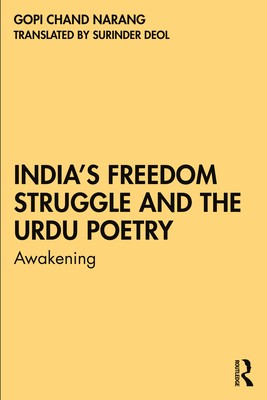
- We will send in 10–14 business days.
- Author: Gopi Chand Narang
- Publisher: Routledge Chapman & Hall
- ISBN-10: 1032424036
- ISBN-13: 9781032424033
- Format: 15.6 x 23.4 x 1.1 cm, softcover
- Language: English
- SAVE -10% with code: EXTRA
Reviews
Description
Poetry, mainly Urdu poetry, played a very significant role in India's freedom struggle. This book explores the poetic contributions going back centuries of colonial rule, which became songs of freedom and captured both the poignancy and fervor of revolution, protest, and hope.
Urdu became one of the essential languages in colonial India, used by both political leaders and many young revolutionaries in speeches and writings as slogans for freedom and a call to action. Poets such as Josh Malihabadi, Firaq Gorakhpuri, Sahir, Makhdoom, Kaifi Azmi, Majaz, Majrooh, and Faiz Ahmad Faiz wrote highly patriotic poetry which was used not only to inspire and help mobilize people but also to offer criticism of existing socio-cultural practices in India and promote reform and equality. This work - a creative and selective translation of the book Hindustan Ki Tahriik-e Aazadi aur Urdu Shaa'yiri by Professor Gopi Chand Narang - includes English translations of poems from rare historical manuscripts as well as banned and witnessed poetry confiscated by the British. It looks at key events in India's struggle for freedom through the prism of literature, language, poetry, and culture while also delving into the lives of poets who became the voice of their generation.
This book is an essential read for students and researchers of colonial and postcolonial literature, cultural studies, comparative studies, history, and South Asian literature and culture.
EXTRA 10 % discount with code: EXTRA
The promotion ends in 17d.14:56:18
The discount code is valid when purchasing from 10 €. Discounts do not stack.
- Author: Gopi Chand Narang
- Publisher: Routledge Chapman & Hall
- ISBN-10: 1032424036
- ISBN-13: 9781032424033
- Format: 15.6 x 23.4 x 1.1 cm, softcover
- Language: English English
Poetry, mainly Urdu poetry, played a very significant role in India's freedom struggle. This book explores the poetic contributions going back centuries of colonial rule, which became songs of freedom and captured both the poignancy and fervor of revolution, protest, and hope.
Urdu became one of the essential languages in colonial India, used by both political leaders and many young revolutionaries in speeches and writings as slogans for freedom and a call to action. Poets such as Josh Malihabadi, Firaq Gorakhpuri, Sahir, Makhdoom, Kaifi Azmi, Majaz, Majrooh, and Faiz Ahmad Faiz wrote highly patriotic poetry which was used not only to inspire and help mobilize people but also to offer criticism of existing socio-cultural practices in India and promote reform and equality. This work - a creative and selective translation of the book Hindustan Ki Tahriik-e Aazadi aur Urdu Shaa'yiri by Professor Gopi Chand Narang - includes English translations of poems from rare historical manuscripts as well as banned and witnessed poetry confiscated by the British. It looks at key events in India's struggle for freedom through the prism of literature, language, poetry, and culture while also delving into the lives of poets who became the voice of their generation.
This book is an essential read for students and researchers of colonial and postcolonial literature, cultural studies, comparative studies, history, and South Asian literature and culture.


Reviews